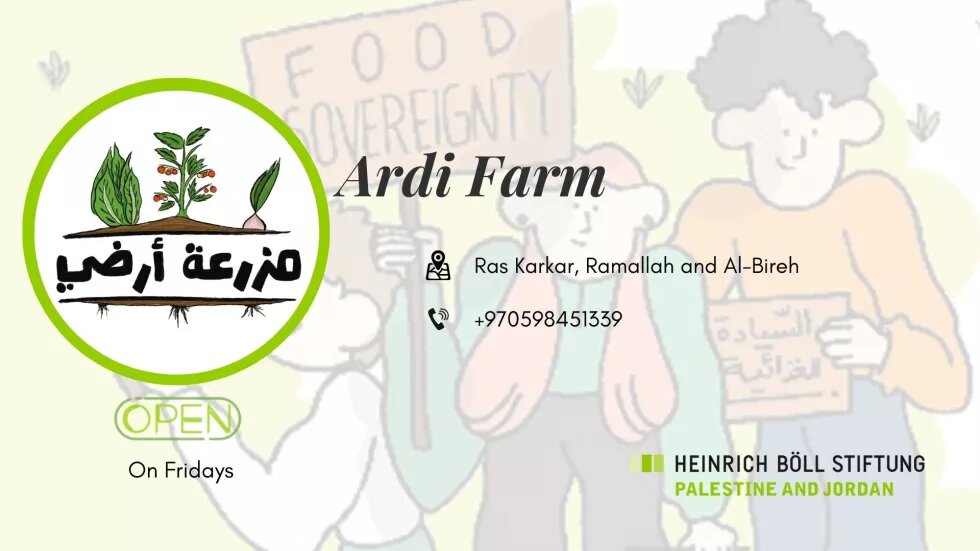
Ardi (My Land Farm) is one of the farms where the founders shared their own story with us:
“We are a group of independent, progressive, and democratic youth of diverse genders, interests and academic and professional backgrounds. However, we all share beliefs in the value of connectedness to the land, collective and collaborative work, and the ability of a collective to bring about change. We believe that giving through volunteer work is one of the most important human values that enhances a coherent social fabric capable of confronting the liberal individualism forced on all nations by capitalism. We volunteer and collaborate to create a glimmer of hope for different and alternative possibilities in life away from the capitalist market."
Why agriculture? As the global economic system faces the predicament of producing a better life for people and the accumulation of its chronic failure at the expense of the poor, the question of existence is no longer a metaphorical one, but rather a question about reality and life itself. Therefore, the issue of renewing the relationship with the land emerged as the ultimate answer and a realistic response to this reality, through the restoration of agricultural activities as a direct process tackling food production, and for what it upholds of human, social, and political values.
The farm forms a model for the embodiment of several concepts, most notably the return to the land as a space for work and creating change within the current economic equation. The location of the farm in the west Ramallah village of Ras Karkar holds additional significance as the area is under the threat of expropriation for colonial expansion. Besieged by a colony from the east and confiscated lands to the west that were designated an Israeli military area, this poses a severe challenge to our work. The construction of houses or sheds or even the use of cement for existing structures are strictly prohibited by the occupation in this area.
The farm activities target young people, especially students, and seek to establish an independent and active youth model away from dependence on institutions or donors. The work on the farm also aims to meet the needs of its members in improving their economic, social, and cultural conditions and organizing them according to the principles, values, and cooperative ethics that are based on democracy, equality, justice, and solidarity. On the other hand, we believe that the protection of Palestinian land is a necessity to support the steadfastness of our people in the face of domination and continued colonial uprooting. Thus, the land here stands as a form of resistance and confrontation. Moreover, the farm provides productive employment opportunities, which will give the youth an alternative to emigrating and leaving the country.
At the same level, we aspire to form a body among all cooperatives to regulate and organize their work in a collaborative manner, within an active and influential union, that addresses the threating conditions on food sovereignty, which is increasingly threatened as Palestinians import their food mainly from the Israeli occupation. This is part of our quest to be part of the global peasant movement against globalization, imperialism, and control over nations.
In 2016, the group initially secured a 2 dunum area of land in Ras Karkar. The property and greenhouses were rehabilitated and the irrigation system and fencing were set. The group has expanded the farm to about 4.5 dunums today and its members reached 15. The farm is cultivated with many crops throughout the year including tomatoes, cucumbers, broccoli, lettuce, cabbage, capsicum, eggplants, and beans using organic farming methods. This was not easy given the little experience the members had in organic farming, which needs many tools and techniques as well as protection. Additionally, so many times, the group faced crop failure or sabotage due to many conditions, including the sensitivity of organic farming.We are marketing our products through our Facebook page as well as through friends and personal connections. In many instances, the quantities we produced were not enough compared to demand, which is gradually increasing, especially with the rising sentiment of rejecting processed foods.
This cooperative model, that we continuously develop and build upon, has contributed to enhancing the values of belonging, commitment, and social relations among the group. The farm also provided a space to activate the culture of volunteering and collective work in this area. In addition, the group is keen on deducting a percentage of the cooperative’s profits to give back to the community and support volunteering and cultural activities.
________________________________
Product Availability: Year-round.
Product Selling Points: Ramallah and the west Ramallah villages of Safa and Kufur Ni’ma.
Volunteering Opportunities: Possibility to volunteer is available year-round through coordination with the cooperative members.
Other Services: Volunteering days and gatherings in a rural atmosphere (making tea and bonfires, a Palestinian breakfast, and folk songs).